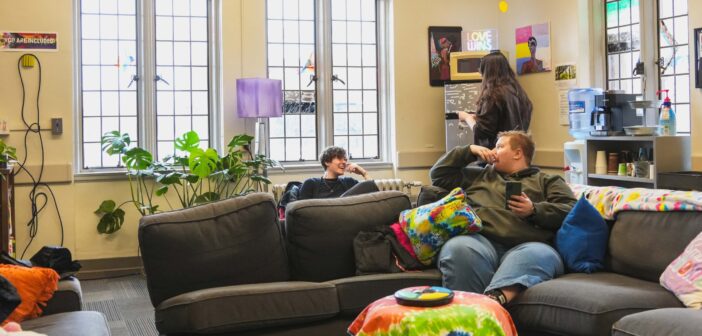Nex Benedict, a 16-year-old non-binary student from Oklahoma, died suddenly on Feb. 7 after they were assaulted in a high school bathroom.
Benedict’s specific cause of death is still unknown, but members of the LGBTQ+ community are searching for answers as rallies take place across the country. This death has also led many to evaluate the state of equity and resources available at Lehigh.
Tyler Katz is the engagement and programming associate at the Office of Jewish Student Life and a non-binary identifying member of Lehigh’s staff. They stressed the importance of education for queer individuals at all levels.
“People need to know about us and who we are and that we just don’t magically exist until we’re 18,” Katz said. “Schools can, and should, be working with LGBTQ+ organizations and people.”
Katz said one of the best things Lehigh could do for its LGBTQ+ students after an event like this is state a clear condemnation on violence.
“Nex Benedict’s murder did not come from nowhere, it arose out of bigotry, it arose out of hatred,” Katz said. “When the two of these things are systematized instead of being condemned, this is how this kind of thing happens. This was a preventable death.”
Maddie DeAngelis, ‘25, majors in political science and English and aspires to be a lawyer one day. She is an LGBTQ+ identifying student and the president of Spectrum, the largest LGBTQ+ undergraduate student group on campus.
Spectrum aims to provide a safe space for LGBTQ+ students and allies to gather. Their meetings involve educating people on queer issues.
DeAngelis said when she was applying to schools, she saw Lehigh ranked high for being an LGBTQ-friendly campus. Ultimately, this factored into her decision in choosing Lehigh.
The Campus Pride Index ranks Lehigh five stars in the institution’s commitment to LGBTQ-inclusive policy, program and practice. Lehigh was also named seventh on the list of most LGBTQ-friendly colleges in the country by College Consensus.
The Diversity and Equity Campus Climate Survey is created by the Higher Education Data Sharing Consortium. Lehigh administers this survey to students, faculty and staff every two years to provide a benchmark for ongoing diversity work.
In 2022, Lehigh’s results indicated that the satisfaction with campus climate for diversity and inclusion averaged at 3.5 out of five.
When talking about her own experience on campus, DeAngelis said she thought she had an easier time on campus as a cisgender, bisexual woman compared to openly transgender or non-binary students.
“I felt as though I was able to move amongst my Lehigh peers who are straight-identifying and not part of queer culture due to the way I present myself,” DeAngelis said. “I don’t present myself as someone who’s not part of the gender binary, but I will say when some people found out I was bisexual in some social circles, things sometimes became a little complicated, which is why I sought out Spectrum.”
DeAngelis explained some people had perceptions and stigmas when it came to her being bisexual.
“It’s like that automatic assumption that just because I like girls, I would be attracted to them, but as we all know, that’s not how attraction works,” DeAngelis said.
DeAngelis said it’s important to educate more about LGBTQ+ individuals as normalizing the idea to the community makes people more accepting and can prevent harmful assumptions.
Scott Burden is the director of The Pride Center for Sexual Orientation and Gender Diversity and is a part of the LGBTQ+ community.
Burden provided a different perspective when it came to normalizing the LGBTQ+ members on campus and what the pride center seeks to do when it comes to this.
“I think queer literally means to not be normal,” Burden said. “I think we’re different. And that’s because we live in a world that says we’re different. There’s a certain aspect to reclaiming that I think is very important.”
Burden said what they and The Pride Center programs are interested in is not normalizing queer individuals, but rather normalizing treating all people with dignity.
Burden said campus policies alone aren’t enough to make a difference; the culture has to be set in place too.
“That’s why The Pride Center has so many ways to get involved and learn about queer people,” Burden said. “We do that through offering support groups, cultivating programs and helping student organizations.”
The Pride Center is located in Christmas Saucon Hall, room 204. According to their website, they work to create an environment where anyone, no matter how they identify, can be comfortable in their own skin.
In the wake of an event like Benedict’s tragic death, the most important thing Burden believes in is to invest in queer futures.
“So many of these efforts and laws are geared towards sort of removing queer people from the history books,” Burden said. “What I can tell you with confidence is that queer people have always existed. Queer people exist today and queer people will continue to exist whether or not a law tells me I can or not.”






Comment policy
Comments posted to The Brown and White website are reviewed by a moderator before being approved. Incendiary speech or harassing language, including comments targeted at individuals, may be deemed unacceptable and not published. Spam and other soliciting will also be declined.
The Brown and White also reserves the right to not publish entirely anonymous comments.